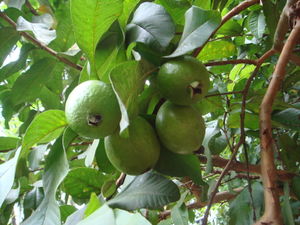Guava
Other names : Psidium guajava L., Guayabo, Goiabeira, red guava , guyava , kuawa
A large evergreen shrub or small tree native to tropical regions. The fruit and the leaves are used as medicine. The tropical fruit can be round, oval, or pear-shaped. The young leaves of the guava tree can be brewed to make a tea that's been part of traditional medicine for centuries in Mexico and parts of South America.
See also : Guava leaves
Special Precautions of Guava
Guava leaf tea is considered safe and without significant side effects, although it might cause constipation in some people, and its safety hasn't been established during pregnancy or breast-feeding. The tea might also interact with diabetes or anti-diarrhea medications. Talk to your doctor about guava leaf tea to decide if it might be helpful for you.
The benefits of Guava are
- Guava is a source of inflammation-fighting nutrients and antioxidants. This fruit has fiber and flavonoids, along with beta-carotene, lutein, vitamin C, and magnesium.
- Guavas contain more of the cancer-fighting antioxidant lycopene than any other fruit or vegetable, and nearly 20 percent more than tomatoes. Our bodies can’t process much of the lycopene in tomatoes until they’re cooked; the processing helps break down tough cell walls. However, guavas’ cell structure allows the antioxidant to be absorbed whether the fruit is raw or cooked, and the whole fruit offers the nutrition without the added sodium of processed tomato products.Lycopene protects our healthy cells from free radicals that can cause all kinds of damage, including blocked arteries, joint degeneration, nervous system problems, and even cancer. Lycopene consumption is associated with significantly lower rates of Prostate Cancer; in addition, men with prostate tumors who consumed lycopene supplements showed significant improvements, such as smaller tumors and decreased malignancy. Lycopene has also been found to inhibit the growth of Breast Cancer cells, and research suggests that this antioxidant may also help protect against coronary heart disease.
- packed with vitamin C and other antioxidants. Serving for serving, guava offers more than 60 percent more potassium than a banana, which can help protect against Heart Disease and stroke. In fact, the nutrients found in guavas have been shown to lower LDL and boost HDL cholesterol, reduce triglycerides, and lower blood pressure.
- Guava leaves contain both carotenoids and polyphenols like (+)-gallocatechin and leucocyanidin. As some of these phytochemicals produce the fruit skin and flesh color, guavas that are red-orange tend to have more polyphenol and carotenoid content than yellow-green ones.
- Diarrhea : Guava leaf extracts decreased spasms associated with induced diarrhea in rodents. Reduced defecation, severity of diarrhea, and intestinal fluid secretion reductions have also been demonstrated. Activity is generally associated with the ability of quercetin and its derivatives to affect smooth muscle fibers via calcium antagonism, inhibit intestinal movement, and reduce capillary permeability in the abdominal cavity.
- Fights infection : Seeds of the fruit contain antimicrobial properties to help fight infections. Concerned about the big rise in bacteria that are resistant to drugs, researchers are looking at alternatives. In one experiment, guava seeds helped reduce growth in two pathogens implicated in urinary and GI infections.
- anti-inflammatory : A multicenter investigation found that guava significantly reduced inflammation and oxidative stress of mice who had diabetes. They explain that in traditional Chinese medicine, which places great importance on fighting inflammation, guava was used as a remedy for inflammation of the GI tract.
- gut health : A Mexican study from the Lab to Investigate Parasites found guava to be helpful in fighting the very common infection giardia. The researchers concluded that guava extract had a medicinal anti-giardia effect in the lab.
- Cardiovascular effects : In an animal model, a water-alcohol extract of P. guajava depressed guinea pig atrial contractility in a concentration-dependent manner. The negative inotropic effect of the extract was blocked by atropine sulfate. In hypertensive rats, intravenous administration of guava leaf aqueous extracts produced a dose-dependent reduction in systemic arterial blood pressure and heart rate. The effect of guava leaf extract on isolated vascular smooth muscle and aortic rings has also been evaluated.
- The flavonoid Morin, which is found in guava and Osage Orange, contains antioxidant properties that can lessen inflammation and improve neurological deficits in cerebral ischemia patients. he researchers found that morin provided beneficial effects on cerebral ischemia assault as it mitigates oxidative stress, prevents apoptosis, and reduces inflammation. Its neuroprotective effects may be used as a powerful agent in the treatment of ischemic stroke.
- Anti-Diabetic Properties : Some of the flavonoids and other compounds in guava leaves may help keep your blood sugar low after you eat a high-carbohydrate meal. The review in "Nutrition and Metabolism" summarizes laboratory findings from several studies indicating that guava leaf tea inhibits several different enzymes that convert carbohydrate in the digestive tract into glucose, potentially slowing its uptake into your blood. It also reports on several clinical trials conducted in Japan that support guava tea's possible anti-diabetic action, showing that drinking the tea regularly helped lower after-eating blood glucose in subjects with Type 2 diabetes, compared to similar subjects who didn't consume the tea.
Medical Disclaimer
This information is not meant to be substituted for medical advice. Always consult a medical professional regarding any medical problems and before undertaking any treatment or dietary changes.
